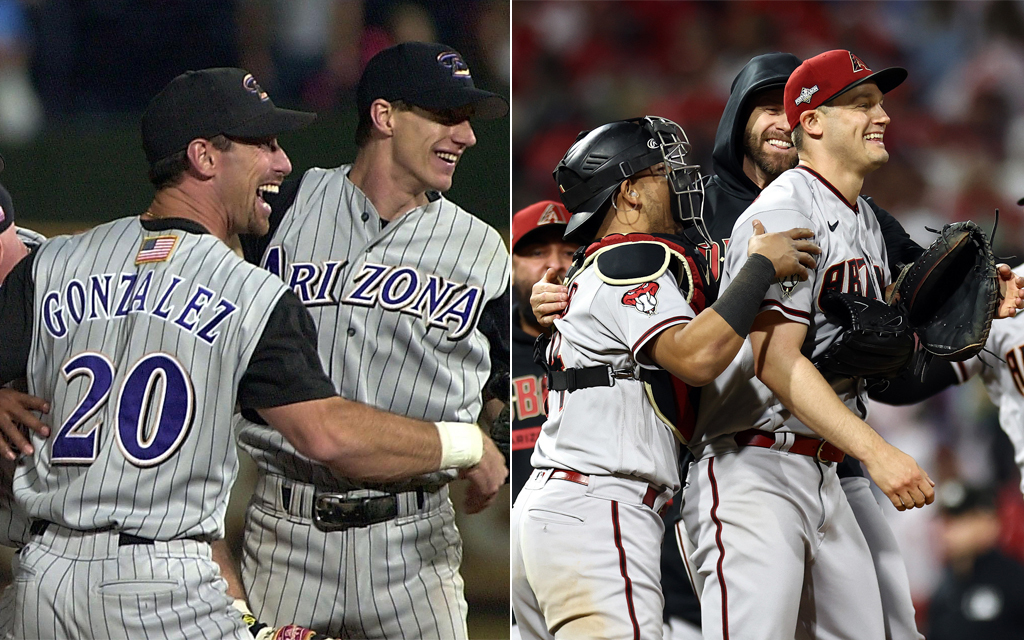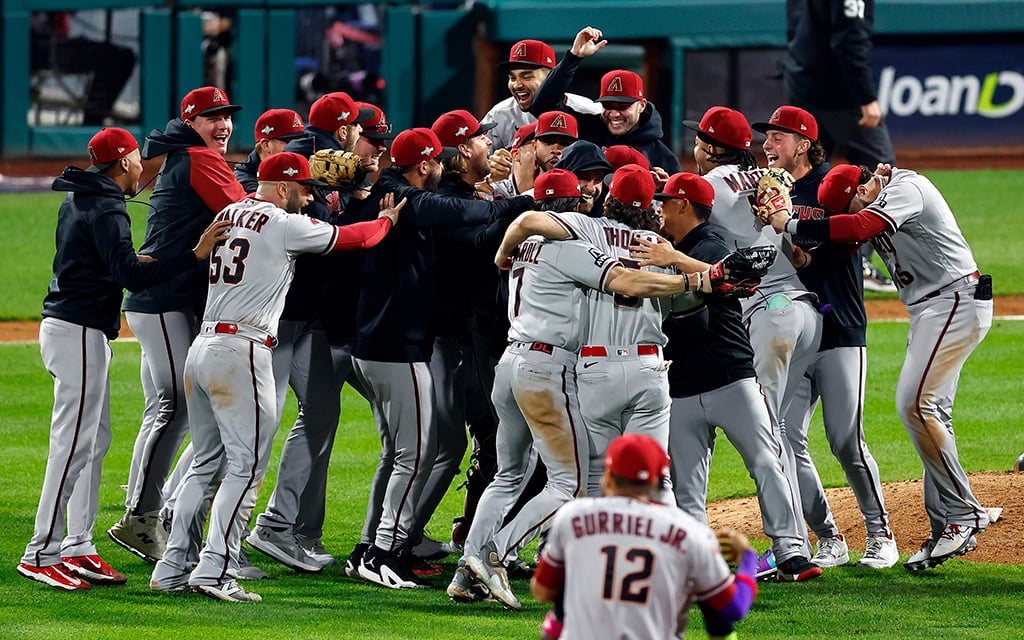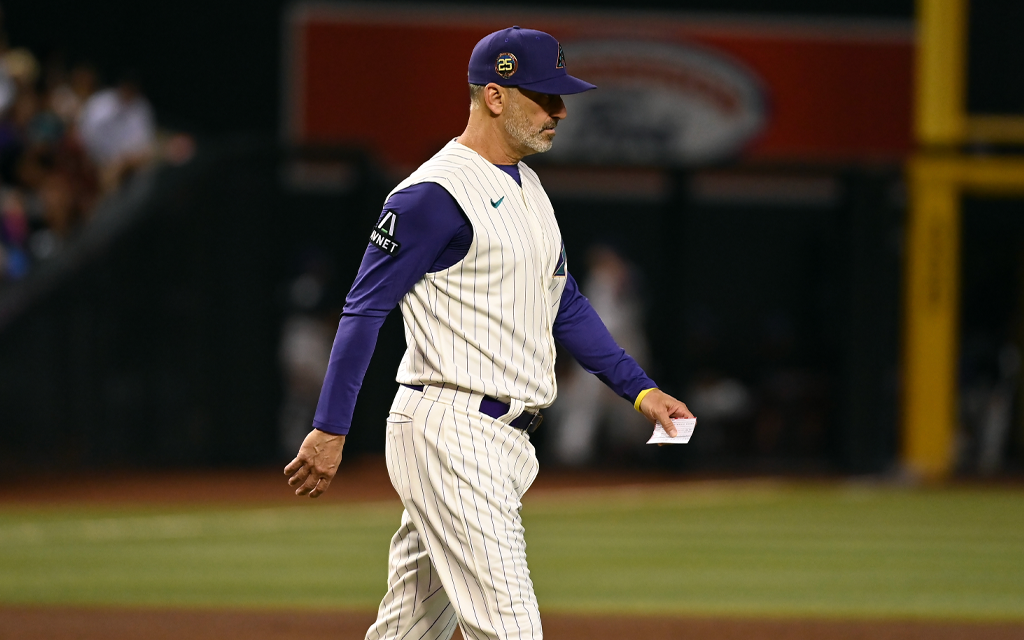PHOENIX – Looking up into the Boston Garden rafters, championship banners flapped above Jerry Colangelo. Legendary Boston Celtics coach and then-general manager Red Auerbach was being interviewed on one end of the court and Colangelo, the Phoenix Suns’ general manager at the time, was doing an interview on the other end.
It was the 1976 NBA Finals and Colangelo’s Suns had reached basketball’s biggest stage in just the franchise’s eighth season. Colangelo was enchanted by the moment, and the position his squad was in.
“I’m thinking to myself, ‘This is pretty good. We’re a young team. Here we are in The Finals, so we’re going to be back a lot.’” Colangelo said. “And then it took (17) years to get back.”
Colangelo, who later put together a group to buy the Suns and would bring major league baseball to the Valley as the first managing partner of the Diamondbacks, told that story about the 1976 Suns to the 2001 Diamondbacks team after a series late in the season against the Brewers in Milwaukee.
It was a reminder that teams have to seize opportunities when they have them, because there is no guarantee that there will be another.
That Diamondbacks club would go on to capture the first championship in Arizona professional sports history.
After 22 subsequent years of professional sports in Arizona that have been filled with missed opportunities, heartbreaks, oh-so-close calls and some downright dreadful seasons, it remains the only major men’s professional sports championship that the Valley has celebrated.
The Diamondbacks are now back in the Fall Classic for the first time since that magical run, trailing the Texas Rangers 2-1, and Colangelo knows from experience that the moment can’t be squandered.
“I told that (story) to the D-back players because the point was: When you get this close, you need to finish the job,” Colangelo said. “Because you never know if you’re going to get another shot. So in this particular case, there’s some young players with the D-backs. If they were to pull this off, and even if they don’t, it’s going to have a great impact on their confidence level and I think it’ll have a great impact on the future of the D-backs.”
‘They’re overachievers’
Colangelo dismissed comparisons of this year’s young Diamondbacks team with the veteran-laden unit from 2001.
He sees the real parallel in the 1975-76 “Sunderalla” Suns, fueled offensively by 25-year-old guard Paul Westphal and 21-year-old rookie center Alvan Adams, along with a few veteran standouts. Phoenix finished the regular season with a 42-40 record and sent shock waves around the league with its upset-filled run to The NBA Finals.
The Suns got there by eliminating the defending NBA champion Golden State Warriors in the Western Conference finals with a Game 7 victory on the road. They ultimately fell in six games to the mighty Celtics in a series that pivoted on a triple-overtime Boston victory in Game 5 at the Garden, often called “The Greatest Game Ever Played” in NBA circles.
The 2023 Diamondbacks are playing with the same underdog, youthful identity – fresh, frisky and free. The two squads hold nearly identical team average ages, with the players on that Suns team averaging 26.4-years of age. The Diamondbacks roster averages 27.5 years.
Rookie outfielder Corbin Carroll and rookie right-handed pitcher Brandon Pfaadt, who was the Diamondbacks’ Game 3 starter Monday, are two of several young, upstart performers who have had signature moments in this year’s playoffs. Their contributions have blended seamlessly with Arizona’s more-seasoned pieces such as designated hitter/outfielder Tommy Pham, first baseman Christian Walker and third baseman Evan Longoria.
The young players and veterans have bonded, bringing to life a mantra that manager Torey Lovullo has repeated throughout the postseason: “A connected team is a dangerous team.”
“You look at the players – they’re overachievers,” Colangelo said of the Diamondbacks. “They’re not guys who come in with big resumes necessarily. That’s why you can’t underestimate the heart of a competitor.”
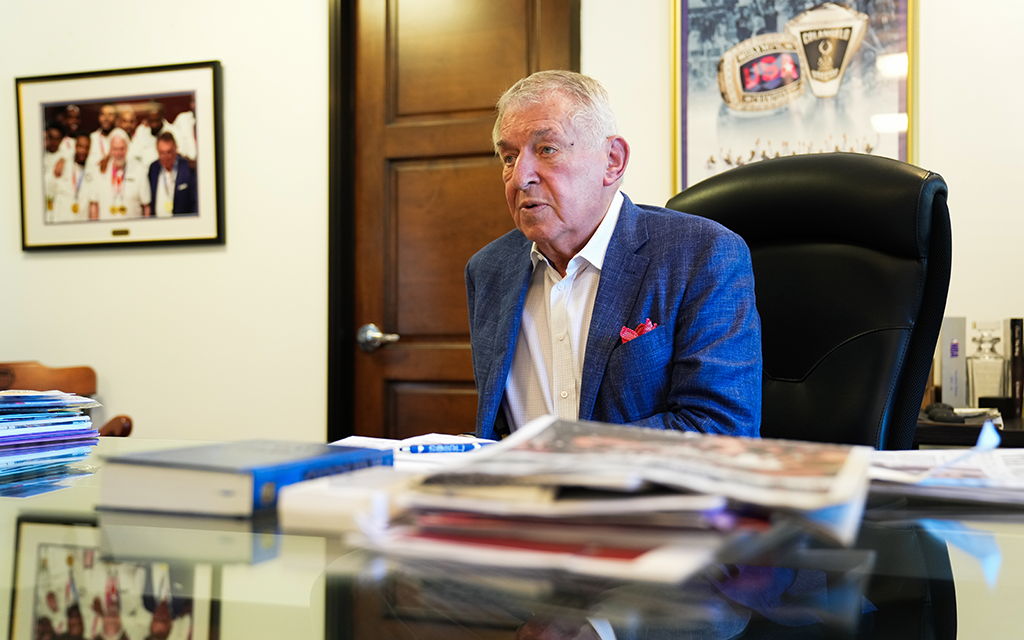
Former Diamondbacks owner Jerry Colangelo compared his 2001 World Series team to his 1976 Phoenix Suns squad. (Photo by William Wilson/Cronkite News)
‘It’s not just the blingy, blangy people’
Baseball doesn’t always go according to plan. The Diamondbacks knocked out two of the biggest spending teams in the MLB during their World Series run, with the Philadelphia Phillies and Los Angeles Dodgers ranking fifth and sixth, respectively, in MLB team payrolls this season, according to Spotrac.
Retired hurler Randy Johnson, the 2001 co-World Series Most Valuable Player for the Diamondbacks, told Cronkite News that competing for championships against high payroll ball clubs is a constant challenge the Diamondbacks face.
Yet, despite ranking 21st in league payroll this season, general manager Mike Hazen has put together a contender and some things have simply fallen the Diamondbacks’ way.
“You have two of the biggest payrolls in all of baseball in the same division that the Diamondbacks are in,” Johnson said. “So it’s hard to contend with the Dodgers, and it’s hard to contend with the Padres. But because you go out and spend a boatload of money like the Padres did doesn’t assure yourself anything, because the Diamondbacks are ahead of them. And the Diamondbacks payroll might be a third of what the Padres’ payroll is.
“But it all comes down to hard work, lack of injuries, and some unforeseen people stepping up and doing amazing things. And that’s what this year has been about with the Diamondbacks.”
Colangelo, 83, knows a thing or two about the winning formula.
Before serving as managing partner of the Suns from 1987-2004, he spent 27 seasons as the team’s general manager. In 2005, he moved on to be the managing director of USA Basketball’s Men’s National Team for 16 years and won four Olympic gold medals.
He shared the same sentiment as Johnson.
“If you’re aligning yourself with good people – I’m talking about talent – it’s not just the blingy, blangy people who have names (and) reputations,” Colangelo said. “Give me the guy who’s fighting in the streets and in the foxholes looking for an opportunity to get somewhere.
“And I think there’s a lot of hungry, young players on this (Diamondbacks) team, and players who have been around the track who never got an opportunity. So you combine all of those things together, and here you have a team that no one believed would get this far.”
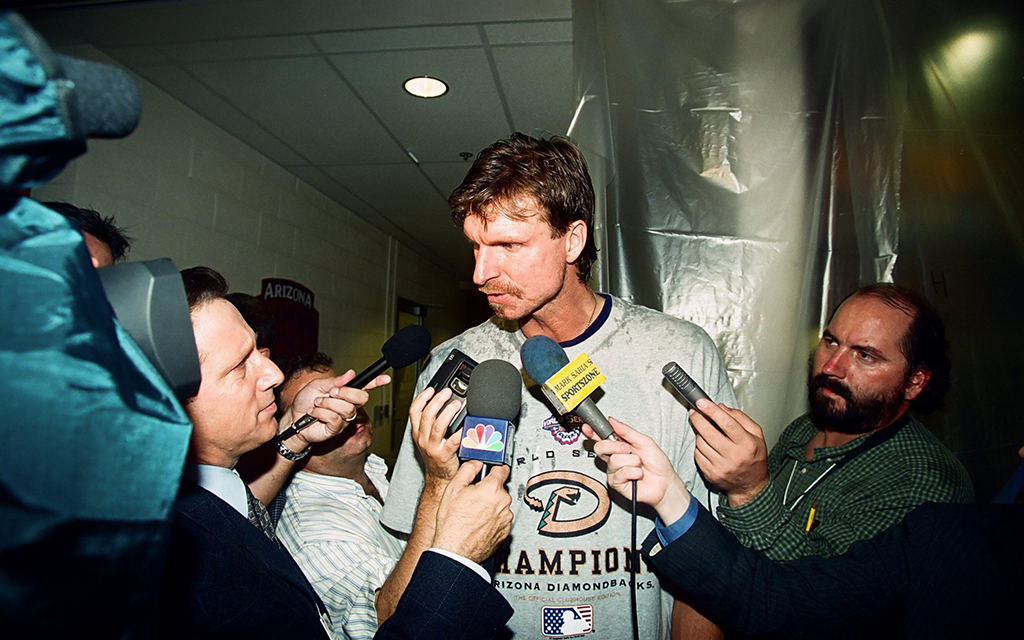
Former Diamondbacks pitcher Randy Johnson said payroll doesn’t always equate to success in Major League Baseball. (Photo by Sporting News via Getty Images)
‘Play ball’, not ‘work ball’
The Diamondbacks are now facing another deep-pocketed organization in the Texas Rangers, a team with more than double the payroll of Arizona that has invested $500 million into its middle infield pairing of second baseman Marcus Semien and shortstop Corey Seager.
But the Rangers’ fortunes didn’t prevent the Diamondbacks from tying the series 1-1 before sending it back to Arizona for Game 3 Monday, which Texas won, 3-1. Before that game, the Diamondbacks had led in the Fall Classic for all but three innings, once again refusing to shrink under the bright lights. This proved true on Saturday in Arlington, when Arizona cruised to a wire-to-wire 9-1 victory after being walked off by an Adolis Garcia home run the night before.
They face the Rangers in Game 4 Tuesday night at Chase Field.
The Diamondbacks’ postseason play has shown that perhaps proven stars and experience – key components to the Diamondbacks’ run in 2001 – aren’t the only recipe for winning a World Series. Former Diamondback shortstop Tony Womack, who played for Arizona from 1999-2003, tends to agree.
“I don’t really see youth as being a thing,” Womack said. “If you love the game, and you play it with passion and you play with your heart and you play the way that you train, then go play. (The umpire) never says ‘work ball,’ he says ‘play ball.’ They go out and play, you go play. You’re going to make physical and mental mistakes. That’s part of it.”
Womack finished his 13-year big league career tied for 100th all-time in career stolen bases. With a Diamondbacks team that embraces its so-called “chaos” amid the new MLB rule changes, Womack said he would have probably stolen 100 bases in a season if he played today.
But while small-ball can be fun, his main message is to play without the constraints of analytics.
“You got to play in the playoffs,” Womack said. “It’s win or go home. Analytics don’t play in the playoffs. I’ve watched teams lose because of analytics.
“You got to play this game as being humans. When you’re hot, I don’t care who you’re facing. That ball could bounce up there – you’re going to get a hit. That’s how it works.”
‘It takes fans, it takes support’
Monday night was the first of what will be three consecutive sellout crowds for the Diamondbacks at Chase Field. Overall, the Arizona faithful have packed the home venue despite facing teams with strong fan bases such as the Dodgers and Phillies.
During the Diamondbacks’ rollercoaster regular season, these types of games were taken over by the visiting team’s fans. The 2023 season was Arizona’s third straight among the lower third for league attendance.
“You can’t ask people to spend their hard-earned money when the product on the field is not winning consistently,” Womack said. “So you can’t get mad at them.”
But the recent momentum points to a potentially significant turning point in the franchise’s fan support. Colangelo draws on his own experience when first taking over USA Basketball to address this topic.
“We had to show the world respect because we had lost their respect for us,” Colangelo said. “How do you earn that? By showing respect. So it’s a two-way street.
“It takes fans, it takes support. It takes commitment on the part of organizations to get to a point where it’s a very attractive proposition, where people want to be involved with the team and want to go to games, and they feel entertained, and they like the personalities, and they like the identity.”
It’s no secret that Phoenix is a Suns town, and Colangelo knows that better than anyone. But he also said that when the franchise started out in 1968, it dealt with the same overwhelming visiting fan support that the Diamondbacks have struggled with for years.
This World Series run can finally change that.
“It’s a predominantly visiting crowd,” Colangelo said. “But getting to the World Series, potentially winning in the World Series, I think will have a great impact on eliminating a lot of that, and you’re going to have more and more loyalty coming from your crowd. There’s nothing but a win here for the D-backs in terms of what they’ve accomplished and potentially can.”
‘Don’t be afraid to fail’
While it might not be fair to compare the makeup of the 2001 Diamondbacks with the 2023 team, one could argue their identities are similar.
A microcosm can be found in the ninth inning of Game 7 back in 2001. Mark Grace lined a single into center field and David Dellucci came in to pinch run for him. Catcher Damian Miller squared a bunt in front of Hall of Fame closer Mariano Rivera, who’s throw to second was off-target and into center field.
Dellucci stayed put. Jay Bell laid a poor bunt down, and Rivera threw out Dellucci at third. Womack, who said he had no nerves in the moment, then ripped an RBI double down the right field line.
Tie game.
That brought Craig Counsell, now manager of the Brewers, to the plate. He was hit by a pitch to load the bases, setting the stage for Luis Gonzalez to attain Diamondbacks immortality. He flared a Rivera pitch just onto the edge of the center field grass to score Bell, sending Bank One Ballpark into a frenzy and Arizona into baseball history.
Now that was chaos. Small-ball at its finest. Sound familiar?
“We didn’t have egos,” Womack said. “I didn’t care who made the most money, (and) I didn’t care who made the least money. It wasn’t about that. We all enjoyed each other’s company.”
On a roster where second baseman Ketel Marte is the highest-paid player this season – earning roughly $11 million – contract drama is the least of the Diamondbacks’ worries. The mission now is to handle business, something the rising Suns weren’t quite able to do in 1976.
Colangelo eventually saw a championship come 25 years later – on the diamond, not the hardcourt. It’s been almost another quarter century, and the Valley sports icon hopes to see it another time.
“The important thing is don’t be afraid to fail, no matter what it takes,” Colangelo said. “What (the ‘01 Diamondbacks) did was one thing. What they’re doing (now) is something else again, and there aren’t any comparisons. It only is how far you got.
“We finished the job (in 2001). I hope they’re able to finish the job in their best interest because it’s so hard to get there.”


